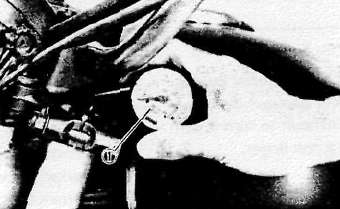Front fork and rear shock absorber adjustment
Front fork air pressure
1. Elevate the front wheel by placing the motorcycle on the center stand.
NOTE:
When checking and adjusting the air pressure, there should be no weight on the front end of the motorcycle.
2. Remove the air valve cap from left fork.
3. Using the air gauge, check and adjust the air pressure.
If the air pressure is increased, the suspension becomes stiffer and if decreased, it becomes softer.
To increase: Use a manual air pump or other pressurized air supply.
To decrease: Replace the air by pushing the valve pin.

1. Air gauge
Standard air pressure: 39.2 kPa (0.4 kg/cm2, 5.7 psi)
Maximum air pressure:118 kPa (1.2 kg/cm2, 17 psi)
Minimum air pressure: 39.2 kPa (0.4 kg/cm2, 5.7 psi)
* Never exceed the maximum pressure, or oil seal damage may occur.
4. Install the air valve caps securely.
Rear shock absorber adjustment
1. Spring preload
If the spring seat is raised, the spring becomes stiffer and if lowered, it becomes softer.
Standard position — A A. position — Softest E. position — Stiffest

2. Damping force
Turn the damping force adjuster by your fingers to increase or decrease the damping force. If it is difficult to turn it with your fingers, use a screw driver.
Standard position — No. 1
No. 1 — Minimum damping force No. 4 — Maximum damping force

1. Damping force adjuster
NOTE:
When adjusting the damping force, the adjuster should be placed in the clicked position. If not, the damping force will be set to the maximum (No. 4).
Always adjust both the right and left absorbers to the same position.
Recommended combination of the front fork and the rear shock absorber. Use this table as guidance to meet specific riding conditions and motorcycle load.
|
\ |
Front fork |
Rear shock absorber |
Loading condition |
||||
|
Air pressure |
Spring seat |
Damping adjuster |
Solo rider |
With passenger |
With accessory equipments |
With accessory equipments and passenger |
|
|
1. |
0.4 ~ 0.8 kg/cm2 (5.7 ~ 11.4 psi) |
A~C |
1 |
O |
|||
|
2. |
0.4 ~ 0.8 kg/cm2 (5.7-11.4 psi) |
A~C |
2 |
O |
O |
||
|
3. |
0.4 — 0.8 kg/cm2 (5.7 ~ 11.4 psi) |
C~E |
3 |
O |
O |
||
|
4. |
0.8-1.2 kg/cm2 (11.4-17.1 psi) |
E |
4 |
O |
O |
||
- Printer-friendly version
- Log in to post comments
